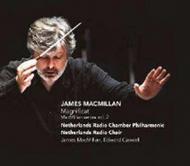
MacMillan - Magnificat, Nunc Dimittis, O, Tryst
£13.25
In stock - available for despatch within 1 working day
Despatch Information
This despatch estimate is based on information from both our own stock and the UK supplier's stock.
If ordering multiple items, we will aim to send everything together so the longest despatch estimate will apply to the complete order.
If you would rather receive certain items more quickly, please place them on a separate order.
If any unexpected delays occur, we will keep you informed of progress via email and not allow other items on the order to be held up.
If you would prefer to receive everything together regardless of any delay, please let us know via email.
Pre-orders will be despatched as close as possible to the release date.
Label: Challenge Classics
Cat No: CC72554
Format: CD
Number of Discs: 1
Release Date: 22nd April 2013
Contents
Artists
Netherlands Radio ChoirNetherlands Radio Chamber Philharmonic Orchestra
Conductor
James MacMillanWorks
MagnificatNunc Dimittis
O (Advent antiphon)
Tryst
Artists
Netherlands Radio ChoirNetherlands Radio Chamber Philharmonic Orchestra
Conductor
James MacMillanAbout
The disc opens with the premiere recording of MacMillan’s Ó, an antiphon for choir, trumpet and strings that incorporates a text in English (O Radiant Dawn) used at vespers on 21 December during the last seven days of the season of Advent.
Magnificat was commissioned by the BBC for the first ‘Choral Evensong’ of the new Millennium, at Wells Cathedral. The choral writing is simple and homophonic, each phrase punctuated by an introspective instrumental echo.
The Nunc Dimittis was commissioned by Winchester Cathedral and is based on similar material. Some of the climactic music from the Magnificat is recalled for the final Amen. Both works exist in versions for choir and organ, and, as here, for choir and orchestra.
Separating Ó and the two other liturgical pieces is Tryst, commissioned by the Scottish Chamber Orchestra and premiered by them in 1989. Its emotional core is a simple melody which MacMillan had previously employed in his setting of William Soutar’s love poem written in broad Scots, The Tryst, and which also cropped up in several of his other compositions.
James MacMillan’s musical language is flooded with influences from his Scottish heritage, Catholic faith, social conscience, and a close connection with Celtic folk music blended with influences from Far Eastern, Scandinavian and Eastern European music. MacMillan first became internationally recognised after the extraordinary success of The Confession of Isobel Gowdie at the BBC Proms in 1990.
Error on this page? Let us know here
Need more information on this product? Click here